

Introduction. What is Depression? - Psychology Issues. All About Depression: Causes. Environmental causes of depression are concerned with factors that are outside of ourselves.
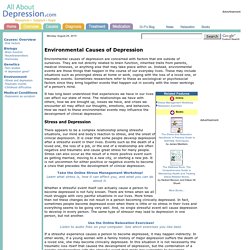
They are not directly related to brain function, inherited traits from parents, medical illnesses, or anything else that may take place within us. Instead, environmental events are those things that happen in the course of our everyday lives. These may include situations such as prolonged stress at home or work, coping with the loss of a loved one, or traumatic events. Sometimes researchers refer to these as sociological or psychosocial factors since they bring together events that happen out in society with the inner workings of a person's mind. It has long been understood that experiences we have in our lives can affect our state of mind. Stress and Depression There appears to be a complex relationship among stressful situations, our mind and body's reaction to stress, and the onset of clinical depression. Take the Online Stress Management Workshop! Use the Online Relaxation Exercises! Depression Symptoms & Warning Signs: How to Recognize Depression Symptoms and Get Effective Help.
Depression: Combination of environmental, psychological and genetic factors. Problems like anxiety and depression are caused by psychological and environmental factors, and are known to be influenced by genetic proclivities.
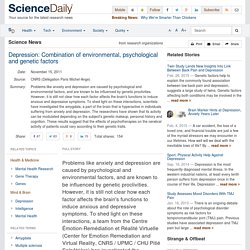
However, it is still not clear how each factor affects the brain's functions to induce anxious and depressive symptoms. To shed light on these interactions, a team from the Centre Émotion-Remédiation et Réalité Virtuelle (Center for Emotion Remediation and Virtual Reality, CNRS / UPMC / CHU Pitié Salpêtrière) has investigated the amygdala, a part of the brain that is hyperactive in individuals suffering from anxiety and depression.
The researchers have shown that its activity can be modulated depending on the subject's genetic makeup, personal history and cognition. These results suggest that the effects of psychotherapies on the cerebral activity of patients could vary according to their genetic traits. This work makes the cover story of the November 2011 issue of Human Brain Mapping. '1 in 5' children suffer from symptoms of depression. SFU Depression Solutions. What It’s Like Living With Depression. Sabrina Benaim - "Explaining My Depression to My Mother" Environmental Factors of Depression. According to the National Institute for Mental Health (NIMH), there is no single known cause of depression.
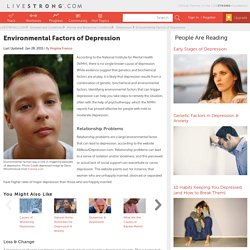
While evidence suggest that genetics and biochemical factors are at play, it is likely that depression results from a combination of genetic, biochemical and environmental factors. Identifying environmental factors that can trigger depression can help you take steps to remedy the situation, often with the help of psychotherapy, which the NIMH reports has proved effective for people with mild to moderate depression. Relationship problems are a large environmental factor that can lead to depression, according to the website AllAboutDepression.com. Chaotic Family Environments Increase Depression and Aggression in Children. Children are a product of their environments.
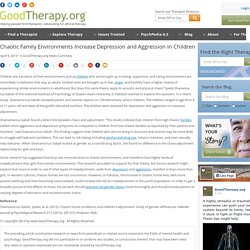
Just as children who are brought up in loving, supportive, and caring environments are more likely to behavior that way as adults, children who are brought up in fear, anger, and hostility have a higher chance of experiencing similar environments in adulthood. But does this same theory apply to acoustic and physical chaos? Syeda Shamama-tus-Sabah of the National Institute of Psychology at Quaid-i-Aaam University in Pakistan wanted to explore this question. In a recent study, Shamama-tus-Sabah reviewed parent and teacher reports on 150 elementary school children. The children ranged in age from 8 to 11 years old and were all living with educated mothers.
Shamama-tus-Sabah found a direct link between chaos and adjustment. Some research has suggested that boys are more sensitive to chaotic environments, and therefore have higher levels of maladjustment than girls from similar environments. Reference: Shamama-tus-Sabah, Syeda, et al. (2013). Lifestyle Factors and Environmental Causes of Major Depression - Depression Resources, Education About Depression and Unipolar Depression.
Lifestyle Factors Physical health is an important foundation of mental health.
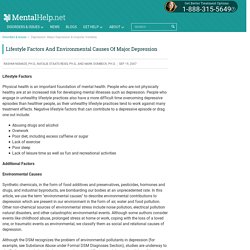
People who are not physically healthy are at an increased risk for developing mental illnesses such as depression. People who engage in unhealthy lifestyle practices also have a more difficult time overcoming depressive episodes than healthier people, as their unhealthy lifestyle practices tend to work against many treatment effects. The boss, not the workload, causes workplace depression. The development of workplace depression has surprisingly little to do with work pressure.
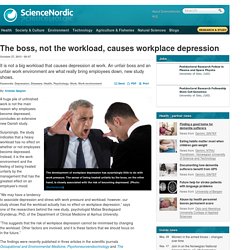
The sense of being treated unfairly by the boss, on the other hand, is closely associated with the risk of becoming depressed. (Photo: Shutterstock) A huge pile of unfinished work is not the main reason why employees become depressed, concludes an extensive new Danish study. Surprisingly, the study indicates that a heavy workload has no effect on whether or not employees become depressed.
Instead, it is the work environment and the feeling of being treated unfairly by the management that has the greatest effect on an employee’s mood. Reducing Hours or Changing Work Environments due to Depression - depression - Devpressed. Hi everyone, I'm new here!
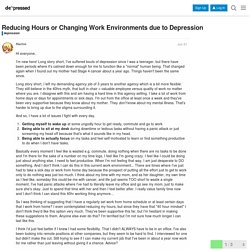
Long story short, I've suffered bouts of depression since I was a teenager, but there have been periods where it's calmed down enough for me to function like a "normal" human being. That changed again when I found out my mother had Stage 4 cancer about a year ago. Things haven't been the same since. Long story short, I left my demanding agency job of 3 years to another agency which is a bit more flexible. And so, I have a lot of issues I fight with every day.